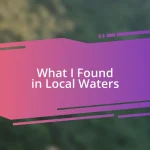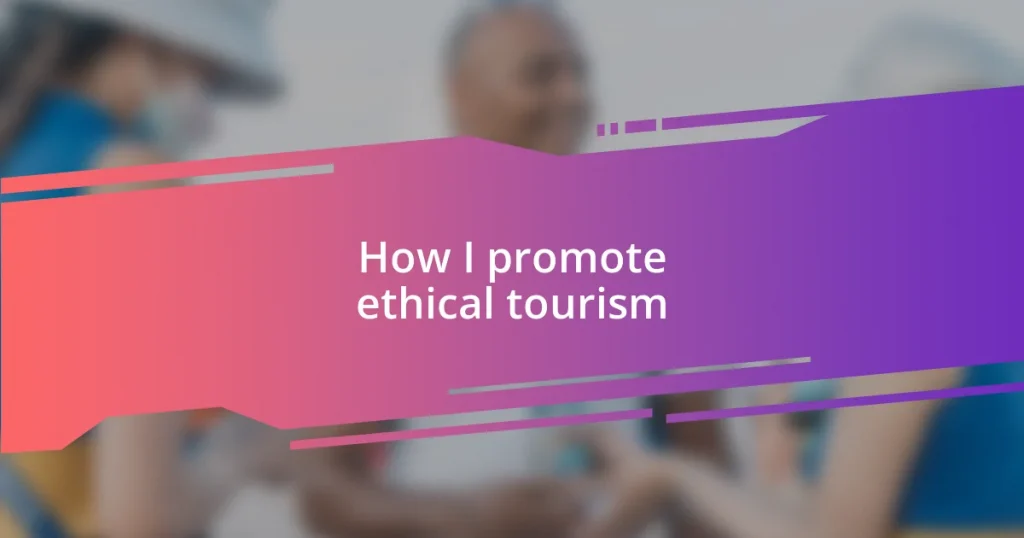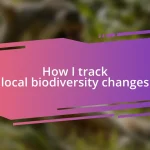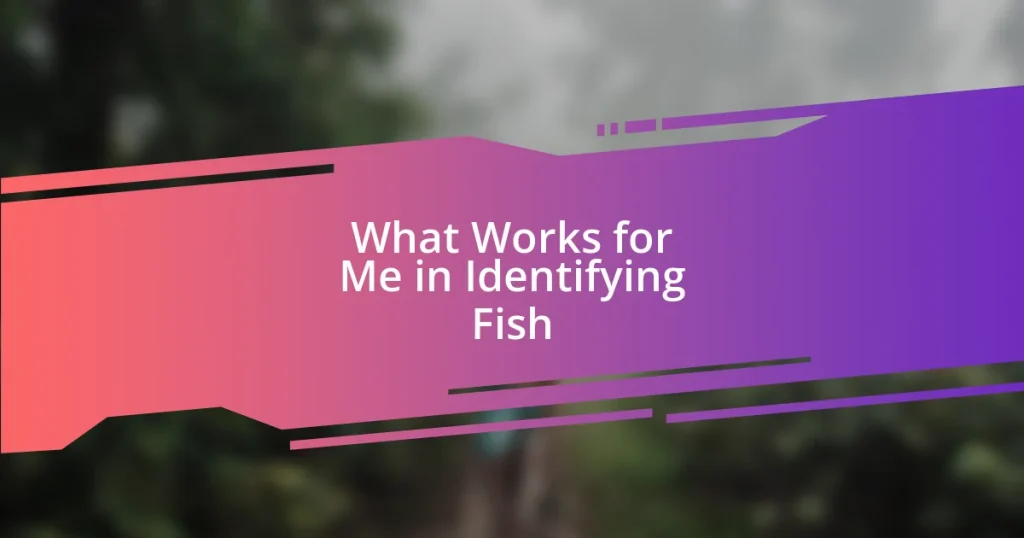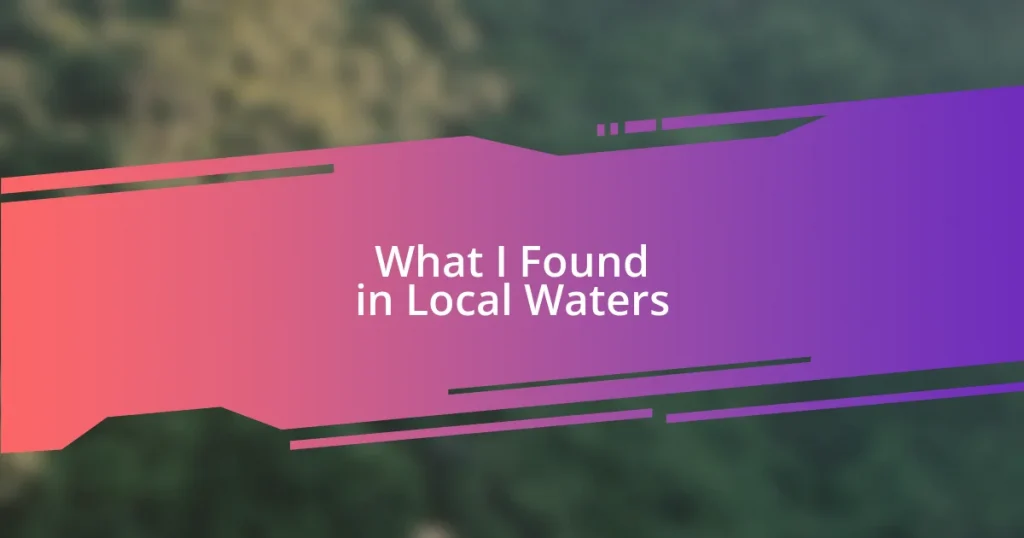Key takeaways:
- Engaging in ethical tourism fosters a deeper connection with local cultures and promotes sustainable practices that benefit communities and environments.
- Promoting ethical tourism involves education, collaboration with local communities, and practicing responsible travel behaviors to ensure genuine cultural engagement.
- Sharing ethical travel experiences can inspire others and elevate local narratives, encouraging a broader appreciation for responsible tourism practices.
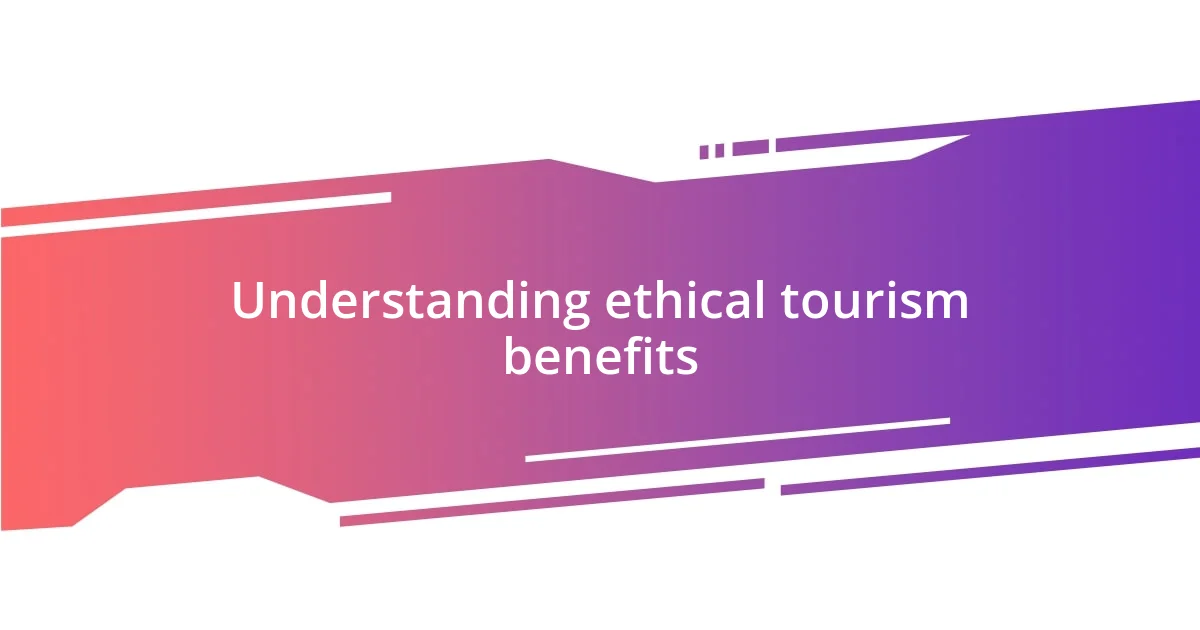
Understanding ethical tourism benefits
Engaging in ethical tourism brings a profound sense of connection to both the places I visit and the communities that inhabit them. I still remember my trip to Costa Rica, where I volunteered at a local wildlife sanctuary. The joy and gratitude expressed by the locals, knowing that tourists were genuinely invested in preserving their environment, filled my heart with a sense of purpose. Isn’t it incredibly rewarding to know that our travels can contribute positively to someone else’s life?
One of the most significant benefits I’ve noticed is the way ethical tourism promotes sustainable practices. When I stayed at a small eco-lodge that sourced local materials and employed community members, I felt more immersed in the local culture. This experience made me realize that my choices as a traveler could help protect natural resources and support local economies. How often do we consider the ripple effects of our travel decisions? They can last long after we return home.
Moreover, ethical tourism fosters cultural understanding and respect. I fondly recall attending a traditional cooking class in Thailand, where I not only learned about local cuisine but also the cultural significance behind each dish. It sparked a genuine conversation with my instructor about her family’s traditions. The memories from this interaction made me feel part of something larger, bridging gaps between different cultures. Don’t you think that such meaningful exchanges strengthen our shared humanity?
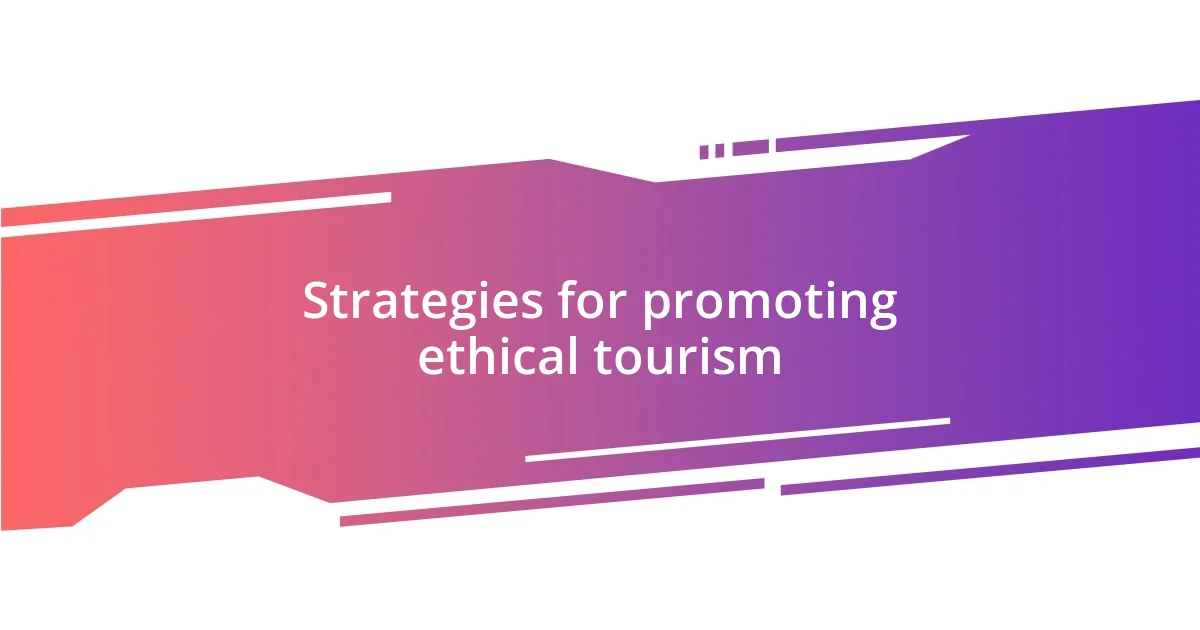
Strategies for promoting ethical tourism
Strategically promoting ethical tourism begins with education. I always advocate for travelers to learn about and respect the cultural values of the communities they visit. For instance, during a trip to Peru, I found that when local guides shared their stories and traditions with me, it deepened my appreciation for their heritage and inspired me to spread their message. This kind of engagement is crucial; it transforms simple sightseeing into a deeper, more meaningful experience.
Here are a few practical strategies for promoting ethical tourism:
- Collaborate with local communities to develop authentic experiences that highlight their cultures.
- Use social media to share stories and images that promote responsible travel practices and local customs.
- Create partnerships with ethical tour operators who prioritize sustainability and community benefits.
- Encourage feedback from travelers on their experiences to continually improve and evolve ethical engagement.
- Support and promote businesses that follow fair trade principles, ensuring local artisans receive fair compensation for their goods.
By implementing these strategies, we can foster a travel culture that not only appreciates the beauty of different places but also respects their people.
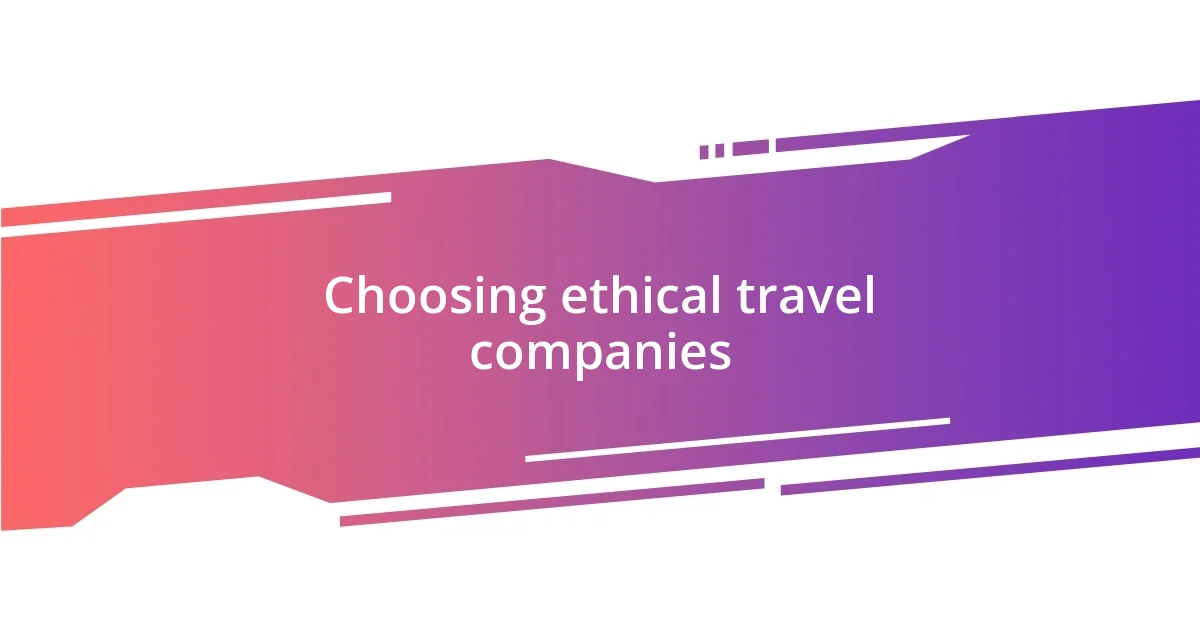
Choosing ethical travel companies
When it comes to selecting ethical travel companies, I always suggest seeking out those that demonstrate genuine commitment to their practices. For example, I once traveled with a company that highlighted their partnerships with local artisans and environmental initiatives. It was heartwarming to see that every tour or experience directly benefited the community. Do you ever feel the satisfaction of knowing your choices create positive change? I certainly do.
A vital factor in my decision-making process is transparency. Reputable ethical travel companies clearly outline their sustainability efforts on their websites. I recall my experience with a tour operator that openly shared details about how they minimize carbon footprints and support conservation efforts. This transparency reassured me that my travel decisions aligned with my values. Have you ever felt conflicted about a travel choice? Finding a company that shares your principles can ease that tension.
Lastly, I prioritize companies that prioritize fair labor practices. During a recent trip, I chose a travel agency that explicitly stated they do not exploit workers in any capacity. It was fulfilling to interact with guides who were well-compensated and genuinely passionate about sharing their culture. I often think about how our decisions as tourists can empower communities rather than hinder them. Isn’t it comforting to know that we can all contribute to a more ethical world through our travel choices?
| Criteria | Examples |
|---|---|
| Transparency | Clearly communicates sustainability initiatives and practices. |
| Community Engagement | Supports local artisans and involves natives in tourism services. |
| Fair Labor Practices | Ensures fair compensation for guides and workers. |
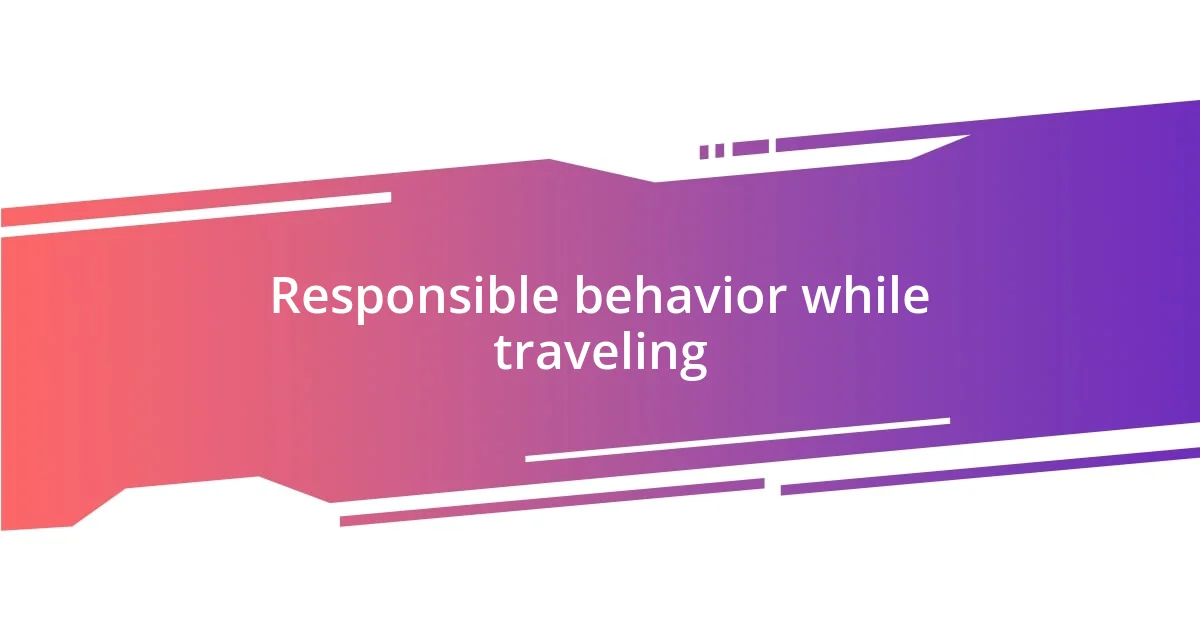
Responsible behavior while traveling
While traveling, responsible behavior comes down to simple yet impactful actions. I’ve always made it a point to research local customs before exploring a new destination. For instance, in Thailand, I learned that appropriate dress when visiting temples is essential. This awareness not only shows respect but also creates a more authentic experience.
When interacting with locals, I’ve found that listening can go a long way. I remember sitting at a small café in Lisbon, where the owner shared his favorite spots in the city. Instead of just making small talk, I listened intently, understanding the culture through his stories. Isn’t it amazing how a genuine conversation can foster deeper connections?
Leaving no trace is another crucial aspect of responsible travel. During a hiking trip in the Swiss Alps, I implemented the principle of taking all my waste back with me. It felt rewarding to leave the environment as pristine as I found it, and it sparked meaningful conversations with fellow travelers about sustainability. Wouldn’t it be incredible if we could all commit to preserving these beautiful places for future generations?
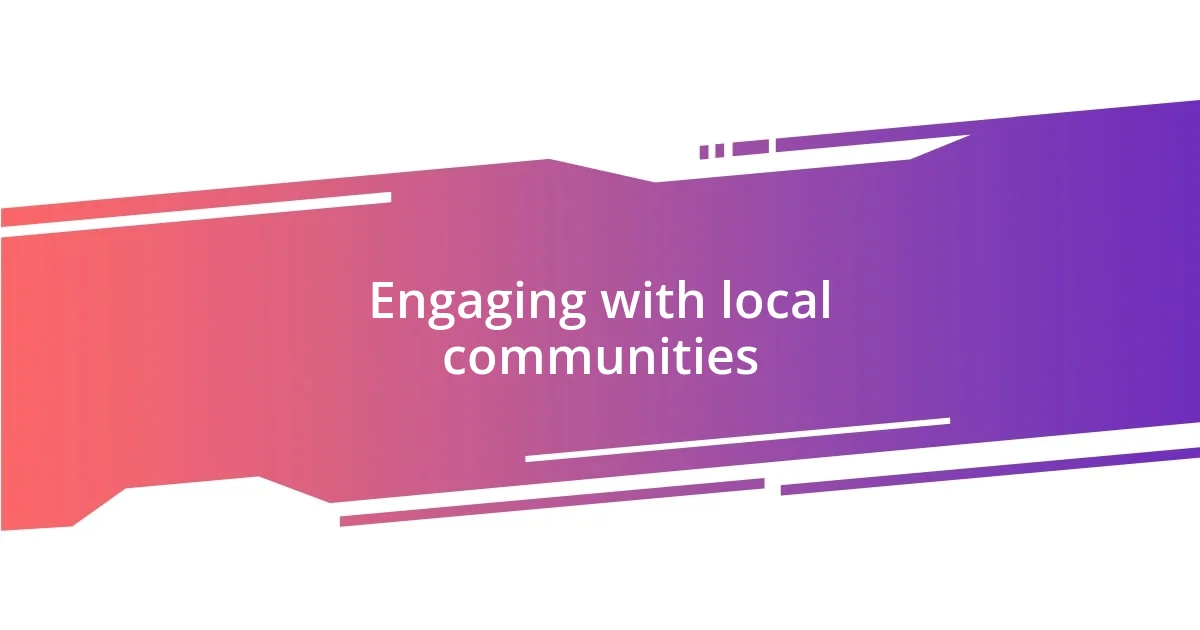
Engaging with local communities
Engaging with local communities is something I’ve always cherished during my travels. I recall visiting a small village in Peru, where I participated in a weaving workshop with local artisans. The joy on the faces of the women sharing their skills was contagious, and it struck me how these interactions not only preserved their culture but also provided them with a sustainable income. It made me reflect: how often do we truly connect with the places we visit?
During that same trip, I stayed in a locally owned guesthouse instead of a large resort chain. The owner, who was also my host, shared stories about the community’s customs and challenges. I was invited to join in a local festival, immersing myself fully in the experience. I realized then that engaging with the community isn’t just about being a spectator; it’s about active participation. Have you ever stepped out of your comfort zone to truly embrace another culture?
I believe that when we engage genuinely, we pave the way for mutual understanding. In a different instance, while exploring a farmer’s market in a small town in Italy, I struck up a conversation with a local farmer who enthusiastically shared details about his organic practices. It’s these moments that remind me how powerful and enriching it can be to support local economies directly. Isn’t it incredible how a simple conversation can bridge distances and foster respect?
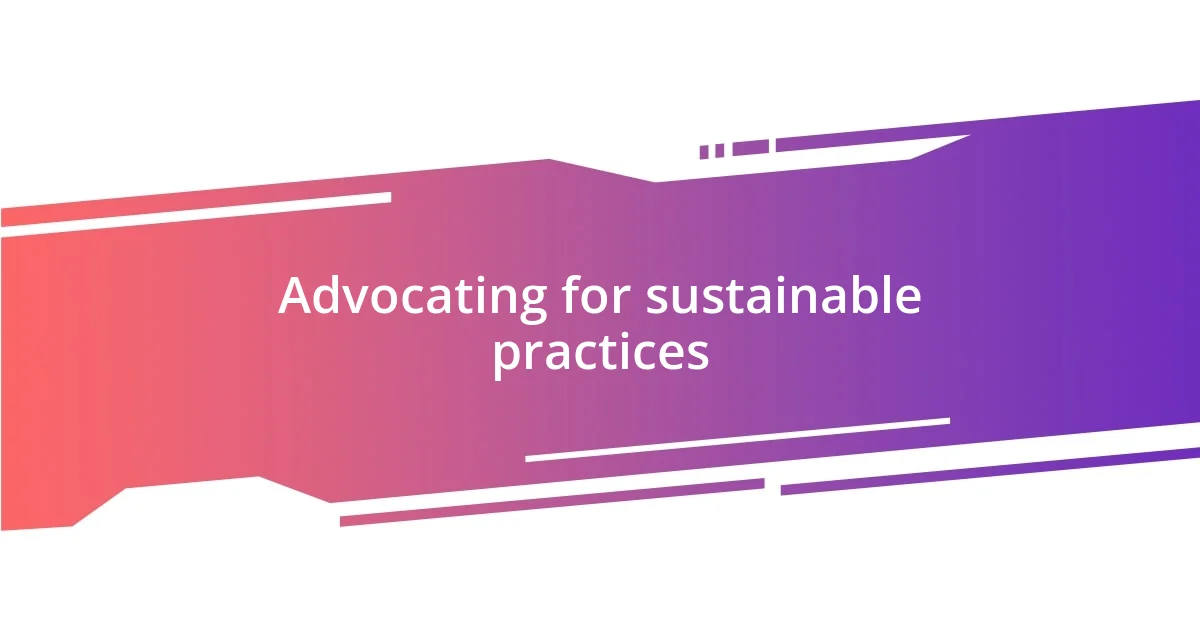
Advocating for sustainable practices
Advocating for sustainable practices is something I feel passionate about. For instance, during a recent trip to Costa Rica, I encountered a fascinating eco-lodge that operated solely on renewable energy. I was impressed not only by their commitment to sustainability but also by the way they inspired guests to make eco-friendly choices, such as minimizing water usage and utilizing locally sourced food. It left me wondering: how often do we consider the impact of our accommodations on the environment?
I’ve also learned the significance of supporting businesses that prioritize sustainability. On a visit to a coastal town in Australia, I made it a point to dine at restaurants that highlighted organic and seasonal dishes. One evening, the chef shared how they partnered with local fishermen to assure the freshest catch while respecting marine ecosystems. I couldn’t help but think about the ripple effect this kind of conscious dining can have on the community.
Moreover, I actively participate in conversations about conservation. I remember attending a workshop on marine preservation during my stay in the Caribbean. The passion of the speakers made me more aware of the fragility of the ecosystems we often take for granted. It reinforced my belief that by advocating for sustainable practices, we not only enrich our travels but also play a role in protecting the planet. Isn’t it empowering to think that our choices can make a difference?
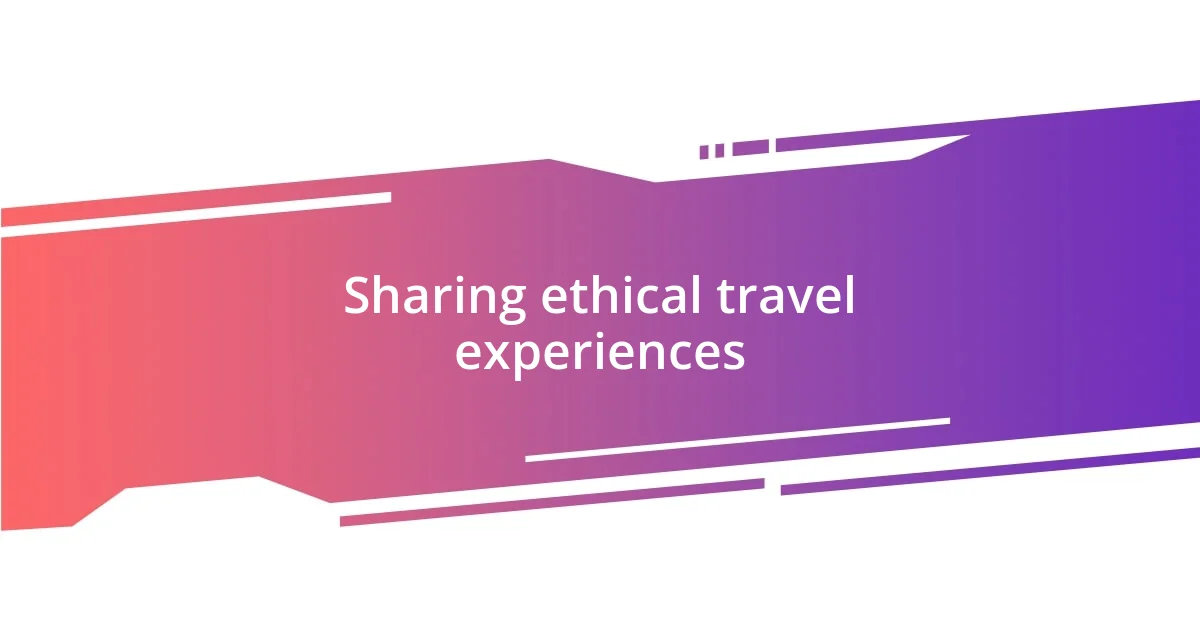
Sharing ethical travel experiences
Sharing my ethical travel experiences has become a way for me to inspire others to approach their journeys with a greater sense of responsibility. For example, after a hiking trip in the Scottish Highlands, I organized a small gathering with friends to recount my adventures. I vividly described how I participated in a conservation project to restore native flora, emphasizing how rewarding it felt to contribute meaningfully to the landscape I so deeply admired. Have you ever thought about how your own travel stories could impact someone else’s journey?
Sometimes, simply documenting my trips can spark important conversations. On my last visit to Japan, I started a travel blog where I shared not only my adventures but also insights into the cultural practices I encountered, like staying at a ryokan and learning about traditional tea ceremonies. Writing about these experiences made me realize how much we can elevate the voices of local communities when we share their narratives with a wider audience. Isn’t it amazing how a story can connect us across cultures?
I’ve also found that engaging with fellow travelers about ethical tourism can lead to profound exchanges. While volunteering in a wildlife sanctuary in South Africa, I shared my personal journey about the importance of ethical wildlife interactions on social media. The feedback was incredible—people reached out, eager to learn more and share their own experiences. It reshaped my understanding of the traveler’s role as a storyteller. Could we all become advocates in our own right just by sharing our experiences? I believe we can.


